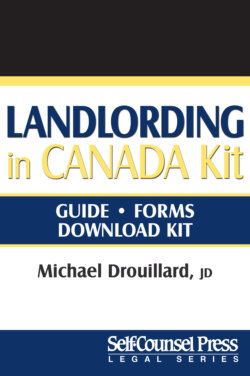Читать книгу Landlording in Canada - Michael Drouillard - Страница 21
На сайте Литреса книга снята с продажи.
Excessive Sound Transfer
ОглавлениеIn a legal multi-family apartment complex, the building code requires significant soundproofing between units. The soundproofing found between the floors of a single family home that contains an illegal secondary suite is usually inadequate. Even the best of tenants run the risk of being labeled noisy when there are inadequate sound barriers.
If it’s impractical and costly to retrofit walls with soundproofing insulation, identify where the potential for sound transfer is greatest, and “spot fix” the problem. For instance, if the home consists of upper- and lower-level units, the upper unit should have wall-to-wall carpeting with thick underlay to minimize sound transfer. It would be problematic for the upper suite to have laminate or hardwood flooring. If this type of flooring is already in the upper suite and cannot be replaced, then make extensive use of area rugs at the very least. Consider requiring the upper suite tenant to use area rugs as a term of the rental agreement, but recognize that you may be expected to subsidize some or all of the cost.
Sometimes only a door serves as separation between the primary living area and the secondary suite. Interior doors are ineffective at reducing sound transfer. If you replace the door with an insulated wall, you might contravene fire safety bylaws in your area. Consider replacing the door with an exterior grade, solid-core door instead.
Include noise reduction practices in your rental agreement. For instance, the rental agreement should have a clause restricting the operation of stereo equipment and major appliances such as the washer, dryer, and dishwasher to daylight hours only.
Keep in mind that if you want such clauses to be effective, the tenant will expect you to adhere to the same rules. Owning a secondary suite means a restriction on the freedoms you normally enjoy as a homeowner — this is part of the price that secondary suite owners pay for the benefit of the extra rental income.
Another transfer issue relates to cooking odours. Ensure that your tenants have access to a high quality range hood and insist they use it while cooking. Also, if only a door serves as separation between the tenant’s suite and your own, then apply weather stripping to the door to make it as airtight as possible.
Even if these measures are implemented, the soundproofing between one living area and the other will never be up to the standard found in a multi-family building. If you want to earn extra income from secondary suites, be prepared to tolerate occasional noise from the tenant’s home theater equipment or noise from people coming and going late at night.
Many enterprising Canadians consider using the rental income produced by a secondary suite to subsidize the cost of the Canadian dream of home ownership. After a tenant moves in, every new noise or every new cooking odour is perceived as an assault on the quiet enjoyment of the home. Secondary suite owners must have realistic expectations. Landlords who own legal duplexes shouldn’t hear neighbours, or smell their cooking. But landlords who own single family homes that have been duplexed after the fact should learn to live and let live, or else find a different way to live the Canadian dream.
